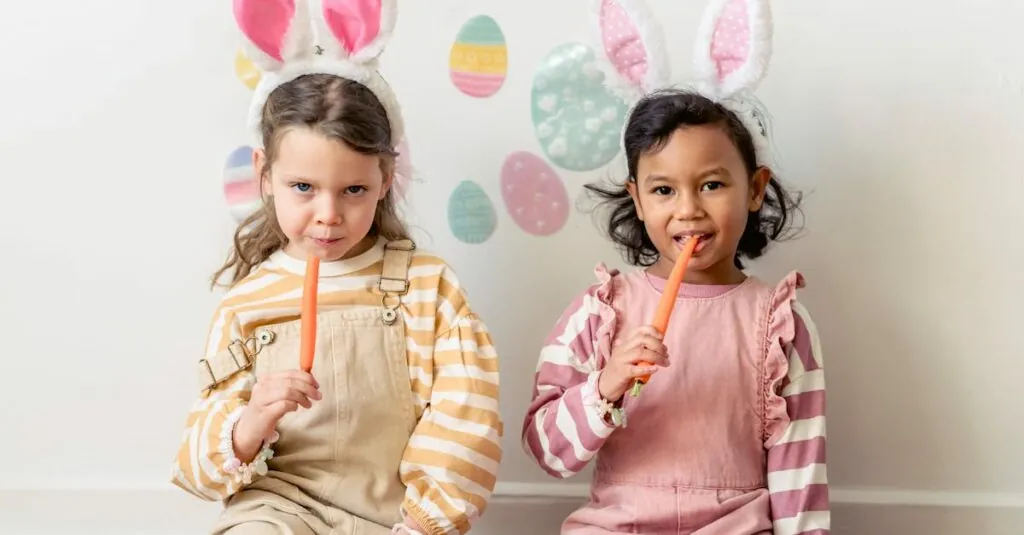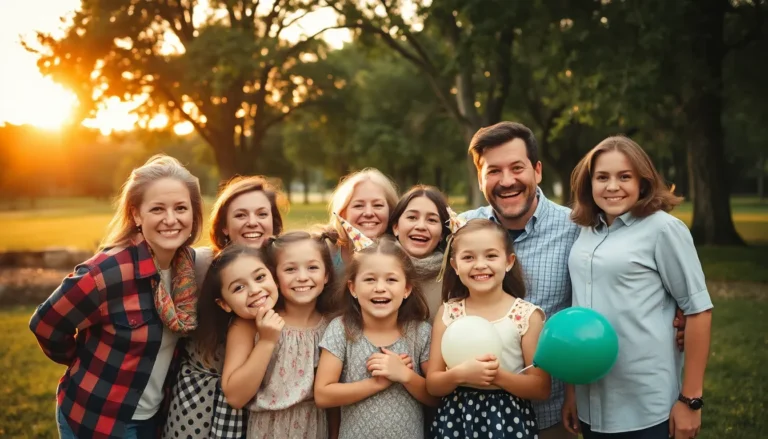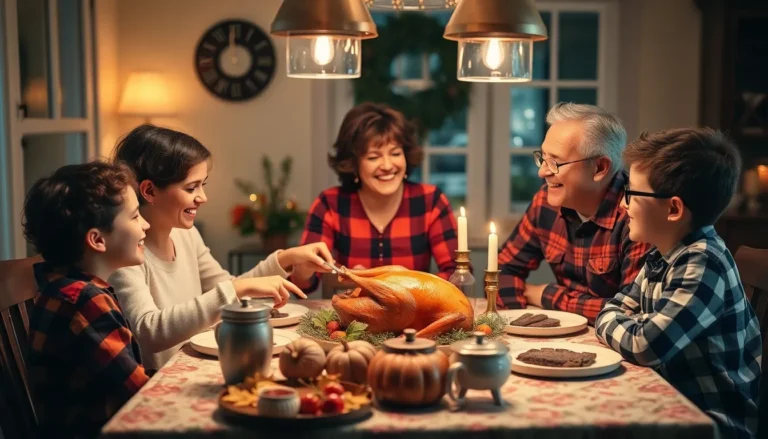Table of Contents
ToggleHispanic family traditions are like a vibrant tapestry woven with love, laughter, and a sprinkle of chaos. From lively fiestas to mouthwatering feasts, these customs bring families together in ways that make even the most introverted relatives break out their dance moves. Picture this: Abuela whipping up her famous tamales while the kids attempt to dodge the ever-watchful eye of Tío Carlos, who’s ready to share his latest “dad joke.”
These traditions aren’t just about the food and festivities; they’re a celebration of heritage and the bonds that tie generations. They remind everyone that family is everything—even if it means enduring another round of “Who’s getting married next?” So, buckle up as we dive into the heart of Hispanic family traditions, where every gathering is a chance to create unforgettable memories and maybe even discover who really makes the best flan.
Overview of Hispanic Family Traditions
Hispanic family traditions encompass a vibrant mix of cultural rituals and celebratory practices. Family gatherings often center around food, with dishes like tamales and empanadas taking center stage. Celebrations such as Día de los Muertos and Quinceañeras demonstrate the blending of heritage and unbroken familial ties.
Interactions among family members highlight the strength of these connections. Storytelling remains a cornerstone, with older generations passing down tales that offer insights into cultural history. Shared moments, like playing games or celebrating milestones, reinforce relationships and cultivate a sense of belonging.
Traditional values also play a significant role in shaping behaviors. Respect for elders holds great importance, with children taught to honor their parents and grandparents. Family loyalty creates a protective network, where individuals support one another in various life circumstances.
Distinct rituals, such as the use of specific decorations and attire during celebrations, contribute to the overall experience. Families often collaborate to create festive environments, enhancing the enjoyment of events. Unique customs, like the piñata at birthday parties, add an element of fun, bringing each generation together in playful competition.
Celebrating bond and heritage characterizes Hispanic family traditions. These customs nurture relationships, foster joy, and create lasting memories that echo through generations. Each gathering represents an opportunity to connect, share, and build upon a rich cultural legacy.
Importance of Family in Hispanic Cultures
Family plays a central role in Hispanic cultures, serving as a foundation for social identity and support. The significance of family extends beyond immediate relatives, encompassing extended family members who share close bonds.
Family Structure and Dynamics
Family units often include parents, children, grandparents, aunts, uncles, and cousins. Relationships among family members exhibit interdependence, with everyone contributing to emotional and financial well-being. Notably, gatherings often involve informal discussions rather than formal meetings, promoting openness and camaraderie. Celebration of milestones strengthens these connections, fostering shared experiences. Cultural expectations emphasize collaboration, responsibility, and respect among members. This interconnectedness ensures that support exists during challenging times and amplifies joy during happy occasions.
Role of Elders
Elders hold a revered position within families, embodying wisdom and guidance. Respect for elders is foundational, as they serve as cultural bearers who pass down traditions and histories. They play an active role in decision-making, reinforcing their importance in family dynamics. Storytelling forms a vital part of their role, as anecdotes passed down offer invaluable lessons and family history. Elders often engage in teaching children values such as respect, loyalty, and hard work, shaping character and fostering strong family ties. Their presence symbolizes continuity, preserving heritage in an ever-changing world.
Celebrations and Rituals
Hispanic family traditions celebrate milestones through various holidays and rituals. These gatherings strengthen bonds and reinforce cultural identity.
Holidays and Festivities
Holidays such as Día de los Muertos and Christmas showcase vibrant customs. Families honor deceased loved ones with altars adorned with photos, candles, and marigolds during Día de los Muertos. Celebrations include lively festivals filled with music, dancing, and traditional foods, fostering connection among family and friends. Christmas brings joyous gatherings featuring festive meals, family games, and the importance of La Posada, which reenacts Mary and Joseph’s journey. Each event emphasizes the power of togetherness and shared heritage.
Weddings and Coming-of-Age Ceremonies
Weddings in Hispanic culture reflect deep-rooted traditions and values. They often entail elaborate ceremonies, vibrant decorations, and a feast that brings families together. Elements like the lasso ceremony symbolize unity, showcasing the couple’s commitment. Quinceañeras, pivotal coming-of-age celebrations, mark a girl’s transition to womanhood. These events feature formal dresses, religious ceremonies, and social dances, highlighting community support. Both weddings and Quinceañeras connect generations, creating lasting memories and bonds that celebrate love and heritage.
Culinary Traditions
Culinary traditions play a vital role in Hispanic family culture, with food serving as a symbol of togetherness. Recipes passed down through generations reflect the rich heritage and creativity of each family.
Signature Dishes and Recipes
Tamales, enchiladas, and empanadas often take center stage during family gatherings. Each dish boasts its own recipe, with variations unique to specific regions and families. For example, Abuela’s tamales might incorporate specific spices that imbue them with cherished family flavor. Salsas provide additional zest, with ingredients like cilantro and lime elevating the taste. Desserts, such as churros and tres leches cake, often finish off meals, leaving lasting impressions that remind families of their roots.
Family Gatherings around Food
Traditionally, food brings family members together, creating moments of joy and laughter. During celebrations like birthdays and holidays, extended family often gathers around large tables laden with various dishes. Sharing meals fosters connections; relatives often recount stories while enjoying Abuela’s famous recipes. Festivals, including Día de los Muertos and Christmas, feature elaborate spreads that celebrate cultural identity through culinary delights. These gatherings not only nourish the body but also strengthen familial bonds and create lasting memories.
Passing Down Traditions
Traditions in Hispanic families pass from one generation to the next through storytelling and shared experiences. Elders often take a central role in this process, sharing cultural narratives that teach important life lessons. These stories capture historical events and family milestones, enriching children’s understanding of their heritage.
Celebrations highlight the significance of rituals in these traditions. Families gather during events like Día de los Muertos and Quinceañeras, engaging in practices that connect them to their roots. Each tradition, whether it’s the intricate decorations or the specific attire worn, underscores cultural identity.
Culinary practices also play a crucial role in passing down traditions. Recipes like tamales and empanadas represent ancestral connections and often involve multiple generations working together in the kitchen. The cooking process becomes a bonding experience, where stories of the past intertwine with the present.
Special occasions often serve as platforms for reinforcing these traditions. Family members come together for birthdays and holidays, creating memorable experiences filled with laughter and joy. Each event strengthens relationships and fosters a sense of belonging, crucial in Hispanic culture.
Moreover, interdependence among family members reinforces these traditions. Extended families support one another in various aspects of life, creating a network that nurtures emotional well-being. This interconnectedness ensures cultural practices remain vibrant and relevant across generations.
Overall, sharing traditions is essential for maintaining a strong family unit. Each story told and meal shared contributes to the rich tapestry of Hispanic heritage, ensuring that the values of respect, loyalty, and love are preserved.
Hispanic family traditions are a vibrant expression of culture that brings generations together. Through shared meals stories and celebrations families create a deep sense of belonging and connection. These customs not only honor the past but also shape the future by instilling values and fostering emotional support.
The unique rituals and culinary practices enrich family life and reinforce cultural identity. As families gather to celebrate milestones they strengthen their bonds and create lasting memories. In a world that’s constantly changing these traditions serve as a vital link to heritage ensuring that love respect and loyalty endure across generations.







